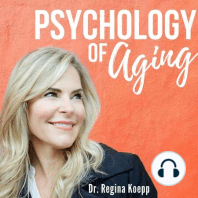13 min listen

The Psychology Behind Retired Doctors and Nurses Returning To Work During COVID-19
The Psychology Behind Retired Doctors and Nurses Returning To Work During COVID-19
ratings:
Length:
12 minutes
Released:
Mar 28, 2020
Format:
Podcast episode
Description
#003 - Do you know any older adults who are refusing to maintain their social distance? Let me give you an example. Have you seen the article of the Italian doctors who returned to work after retirement to assist the Italian healthcare system only to become seriously ill or die themselves as a result of the Coronavirus? A listener actually recently emailed me to say that she's really worried about her own parent who recently returned from retirement to assist with their medical clinic... and this clinic doesn't even treat Coronavirus! This listener was distraught! She felt powerless over her older parent's decision. I wanted to spend some time on this podcast talking a little bit about the psychological underpinnings of why older adults might refuse to maintain social distance and work instead. In this episode, I share two psychological theories to explain why older adults may put themselves at risk by working rather than remain socially distant, including:>> Sebastian Junger's, Tribe Phenomenon>> Erik Erikson's Psycho-Social Development Model Here’s a look at what I talk about in this episode…[02:20] Discover the similarity between soldiers returning from deployment only to request to return to the front lines and healthcare workers returning from retirement to work during COVID-19.[02:44] This phenomenon is best described in Sebastian Junger'sbest selling book, Tribe.[06:03] Ever wonder why as humans we have an innate drive to create and contribute to the wellbeing of others? Erik Erikson's Psychosocial Development model helps us understand this with his stage, Generativity versus Stagnation.[07:10] I share one of my favorite examples of Generativity, Sarah Blakely.[08:02] Learn about the psychological and social downside of not mastering Generativityin middle age. There's even a name for it- Stagnation. [08:38] Learn what it takes for older adults to reflect on their lives and experience few regrets, according to Erikson's final stage in human development - Integrity vs. Despair. [09:39] Lastly, I tie up these theories in a lovely bow to discuss the notion that older adults who choose to work may be acting with integrity to put themselves at risk, and at the same time may be protecting themselves from despair.By the end of this episode, you'll have a better understanding of why some older adults may choose to work during COVID-19 despite great risk to themselves.Check out the show notes here! Download your free COVID-19 Wellness Guide for Older Adults here! Rate and Review Psychology of Aging Podcast with Dr. Regina KoeppIf you're on Apple Podcasts, help me help more people by rating and reviewing my show. Reviews let others- just like you- care for the older adults in their lives.It's simple: 1. Just click here2. Scroll down to "Ratings and Reviews" 3. Tap or click "Write a Review"I read them all! Thank you so much!
Released:
Mar 28, 2020
Format:
Podcast episode
Titles in the series (100)
Welcome to the Psychology of Aging! by Psychology of Aging with Dr. Regina Koepp